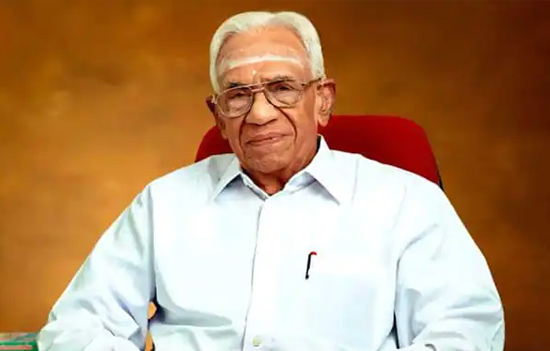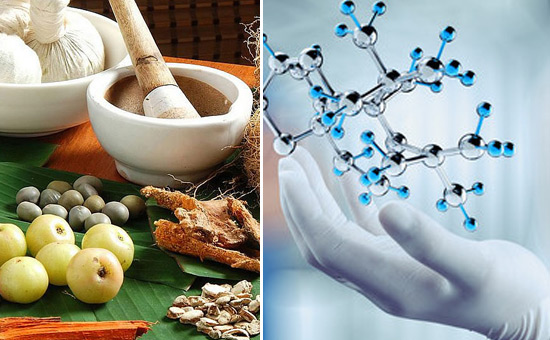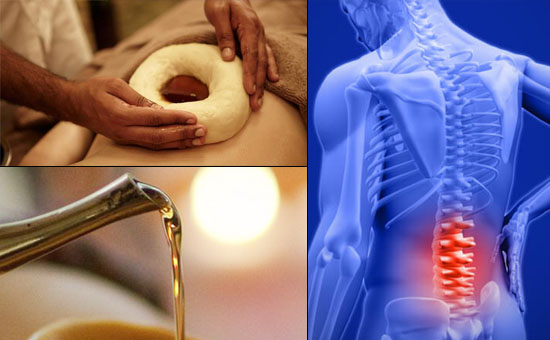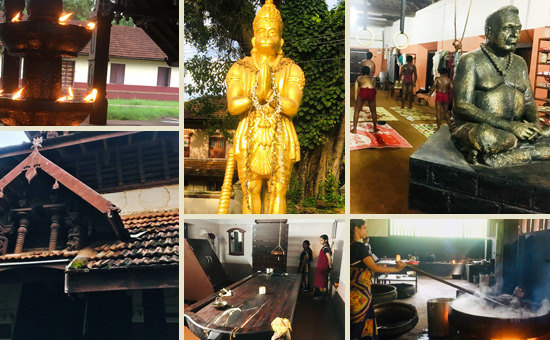- How a neuroscientist frustrated with the allopathic approach to health became one of Europe’s foremost champions of Ayurveda. Dr Morandi shares his views on and vision for Ayurveda and about Ayurveda Education in Italy.
I was charmed by Dr Antonio Morandi’s
presentation during the UN’s World Day for Cultural Diversity for Dialogue and
Development” (“World Culture Day” in India) event held online by the Indian
Council for Cultural Relations on May 21, 2020. As he spoke on the contemporary
relevance of Ayurveda, his love for India, Hinduism, Vedic science and Ayurveda
itself was self-evident. Trained as a neuroscientist, he had worked three
decades in that field in the US and Italy before the limitations of modern
medicine became too much for him. Two decades ago, he turned to Ayurveda.
Today, after lengthy training in India, he heads Ayurvedic Point, a school and
clinic in Italy, and is president of the Italian Scientific Society for
Ayurvedic Medicine.
Dr. Morandi’s passions coincide precisely
with our work at the India Foundation’s Center for Public Diplomacy and Soft
Power, as he exemplifies one of our major goals. We have identified Ayurveda as
one of India’s civilizational strengths. As such, we are advocating the creation
of a World Ayurveda Day, along the lines of the International Yoga Day, which
likewise celebrates one of India’s key soft powers. Partners in this effort to
create a World Ayurveda Day include Rajiv Vasudevan, head of AyurVAID
Hospitals; Dr. Rammanohar, research director of Amrita School of Ayurveda; JIVA
Ayurveda; and 60 organizations in 32 countries. Our pilot initiative in 2019
was endorsed by India’s Ministry of Ayurveda, Yoga and Naturopathy, Unani,
Siddha and Homeopathy (AYUSH) and the Indian Council for Cultural Relations.
Guiding our thinking in part was a 2017
study by the Confederation of Indian Industry, which warned policy makers and
practitioners not to let Ayurveda be appropriated by other countries-as has
happened with yoga-but rather to keep it firmly attached to its roots. Dr.
Morandi is an excellent example of how Ayurveda can be successfully
transplanted to a European country with full authenticity.
This article
was first published in Hinduism Today.
One Doctor’s
Journey to Ayurveda
The word best used to describe Dr.
Morandi would be inquisitive. All his life, he has intended to understand the
functioning of the mind. This drove his study of neurology and his career as a
conventional medical practitioner. But he did not find there the answers he was
looking for.
“Modern medicine dealt with health science
in a fragmented way. I felt I needed a different epistemological approach, one
that could give me a global world view and could link elements which were
considered by modern medicine to be separate, unrelated. Thus, I started to
explore other systems of knowledge. After some consideration of diverse areas,
in both traditional and non-conventional medicines, I found my pathway to
Ayurveda,” he explains.
He has studied Ayurveda in India and from
Indian teachers in Europe, and continues his study on a daily basis. His
principal teachers have been Maharishi Vaidya Jaya Ramanuja Raju and the late
Ashtavaidyan Alathiyoor Narayanan Nambi. He maintains close connections with
Raju and with Nambi’s family.
He has taken Swami Joythimayananda, a Sri
Lankan Tamil saint, as his spiritual guru and considers him a great master of
yoga and Ayurveda. Morandi recounts he initially found it difficult to accept
spirituality, owing to his background in neurology and attitude as a modern
physician. But soon he realized that spirituality enabled him to look beyond
those limitations. “In following Swamiji, I began to understand who I really
am.”
Inspired by Swamji, Morandi established
Ayurvedic Point in 2001, with cofounder Carmen Tosto. Tosto studied Ayurveda
with the Nambi and Ashtavaidyan Thaikkattu Mooss families. In the process, both
she and Dr. Morandi embraced Hinduism. Carmen first met Morandi through Swami
Joythimayananda with whom she was also studying Ayurveda.
“My goal and dream,” she said, “had
always been to promote the integration between yoga and Ayurveda.
Morandi and I began to work together by
founding Ayurvedic Point, with a twofold objective: the care of patients and
the creation of a training school in Ayurveda operated with respect to the
tradition. Our experiences in India with our teachers guide and inspire our
steps to this very day.”
 Ayurveda’s
Sushruta-Dr P K Warrier.
Ayurveda’s
Sushruta-Dr P K Warrier.
Ayurveda for Today’s World
“Challenges to modern medicine are fast
emerging,” Morandi observes. “There’s an increasing disease burden for which
the pharmaceutical industry is failing to produce cures.”
Ayurveda’s person-centered approach is
mainly concerned with the maintenance of health, the prevention rather than the
treating of disease. Because it looks beyond the purely structural and material
view and considers life as
a whole, Morandi believes it
has much to offer contemporary health science. This is exactly, he points out,
the approach of the 21st-century physicists who are attempting to include the
phenomenon of consciousness in their understanding of the universe.
He explains, “The nature of the individual
is a parameter on which the whole system’s scale is tuned. Health is
resilience, or the capacity of adaptation of an organism to the environmental
variations. Ayurvedic
diagnosis is based on the definition of the prakriti, the inborn psycho-physical
constitutional health state of the patient. Its biomedical validity has
recently received wide confirmation from genomic studies. Health is an
individual, relative state, and prakriti explains the individual susceptibility
to particular diseases. Ayurveda promotes
a model of positive health, thinking, feelings and general state of well-being.”
But Ayurveda is more than just health. Morandi believes
Ayurveda reflects all the darshanas (schools) of philosophy in which Indian
thought is rooted. It is itself a full-fledged knowledge system, only one
component of which is medicine. In fact, states Morandi, “I don’t like to use
the term Ayurvedic Medicine, because it is very limitative and reflects the
deterministic model of thinking, which is typical of the modern Western world.
The Western system of thought is based on objects and that everything must be
well defined and have clear boundaries to be understood.” The holistic
knowledge system of Ayurveda, on the other hand, provides a representation of
reality within which we can define our most appropriate lifestyle, one in
perfect alignment with nature and with the possibility of enjoying an ideal
state of health.
Ayurveda Enables
Sustainable Living
Morandi’s holistic approach to Ayurveda
mirrors that of the Ayurveda Day Pledge developed by our team in India: “I
pledge to make Ayurveda an integral part of my daily life and thereby enable
good health and well-being for myself, my family, and my community, in harmony
with nature.” This was accepted by all participating countries and affirms the
importance that Ayurveda attaches to coexisting with nature.
Living in harmony with nature has been a
consistent theme in the various conferences on Ayurveda Morandi has organized
over the past decade. Ayurveda helps one know nature through the eyes of
nature, thus it is one of the best enablers of sustainable living. It is a
science of perfect ecology. Morandi sums it up aptly: “In the West, ecology is
the study of environmental balances, but always considers man as an external
observer. In Ayurveda the ecology includes man and it is an autopoiesis
mechanism.” Autopoiesis means “a system capable of reproducing and maintaining
itself,” which nature should be if man, in particular, respects his place in
it.
 Ayurveda and Modern Concepts. Article link at end of article.
Ayurveda and Modern Concepts. Article link at end of article.
Ayurveda’s Legal Status in Italy
Morandi has worked diligently to
increase the acceptance of Ayurveda in Italy. Currently, he explains, Ayurveda
is considered as a “medical act” by the Italian Federation of Medical Doctors
board. By medical act is meant any activity which deals with the health of
people and involves diagnosis and prescription. In Italy the practice of
ayurvedic diagnosis and prescription can be performed only by a certified
modern medical doctor who also has a certified training in Ayurveda—a
significant constraint.
No traditional form of medicine has yet
been duly and fully recognized by the Italian government. But Morandi is
positive there is growing interest in academic, scientific and clinical worlds
towards Ayurveda in particular. For example, he recounts, “We have just
completed a project in collaboration with the University of Milan, Departments
of Neurology and Clinical Psychology, on Duchenne muscular dystrophy.” In
addition, he is actively involved with the University of Milan’s Faculty of
Medicine to develop an elective course, “Introduction to Ayurveda,” to expose
fifth- and sixth-year medical students to the principles and vision of
Ayurveda.
 Kasti Basti-Ayurveda
care for the Back
Kasti Basti-Ayurveda
care for the Back
Programs at Ayurvedic Point
Morandi and Tosto founded Ayurvedic
Point in 2001 to help manifest this vision of Ayurveda in Italy. The activities
of Ayurvedic Point comprise three key pillars: an educational and cultural
sector; the school of Ayurveda; and a clinical and research sector. Since 2007,
Ayurvedic Point has been awarded the ISO 9001 certification of quality for its
teaching activities.
The School of Ayurveda offers two
four-year postgraduate courses, one for physicians and one for technicians.
Each course follows a comprehensive set of training standards in Ayurveda
produced by the World Health Organization (bit.ly/WHO-Ayurveda).
In addition, Ayurvedic Point offers
in-depth clinical research programs in collaboration with the Ayurveda Research
and Education Institute of SNA Oushadhasala, one of India’s leading producers
of ayurvedic products.
Students at Ayurvedic Point can earn credits
under the Italian Governmental Program of Continuous Education in Medicine. The
course for technicians is also recognized by Accredia, a private, nonprofit
organization recognized by Italy and the European Union which publishes
voluntary technical standards, including UNI norm 11756:2019, the standard for
Ayurveda. Morandi says it has taken six years of hard work to accomplish this
much, and still Ayurveda has no official recognition in Italy as a medical
system. In general, he explains, alternative medicine contends with political
and economic interests and an overall hostile environment.
Ayurvedic Point’s teaching board currently
comprises fifteen teachers, ten of whom are medical doctors with documented
clinical, research and teaching experience. Coordinating the faculty are two
medical doctors and a certified Ayurveda technician who is qualified both in
India and Italy.
Ginevra Franzoso graduated as an Ayurveda
technician in 2019 after four years of study and now works at the Milan clinic.
He continues to be a student of the joint SNA/Ayurvedic Point program in India
and Italy. Franzoso’s immensely grateful for his training and, as he puts it,
“the opportunity to meet Ayurveda in its most traditional and purest sense.”
“My life,” he states, “has profoundly changed. As I have travelled down this
path, I have understood how strong and vital this ancient knowledge is and its
impact on all of us.”
Over 100 students are currently enrolled in the school. In
the 19 years since its founding, 400 students have completed the four-year
course either as doctors (who necessarily are licensed allopaths in Italy) or
technicians in Ayurveda. With the help of SNA Oushadhasala they have developed
a further diploma program, “specialist in panchakarma.” There are two courses
of study, one four years for doctors and the other three years for technicians.
Six hundred students are in the process of study or have graduated. In addition
to these formal programs, 3,000 people have attended academic seminars and
received a certificate of attendance. All these teachings are performed under
the ISO 9001 certification of quality.
Ayurvedic Point operates outpatient
medical centers which so far have treated more than 15,000 patients from Italy
and the wider European Union.
The school conducts advanced seminars on a
monthly basis. In addition, it develops research projects in collaboration with
Italian and international academic institutions. Periodically they organize
major conferences on Ayurveda. Two have been held in Milan, in 2009 and 2016,
and one in Thrissur. Each attracted about 300 delegates, mostly from the
European Union.
Dr. Morandi reports, “Our main vision of
the conferences over the years has been ‘Ayurveda: The Meaning of Life,’ with a
focus on the relationship between awareness, environment and health. Each event
produced large echoes in the worlds of Ayurveda and modern science. Prof. Brian
Josephson, Nobel laureate in physics, opened the first congress in 2009. These
events witness participation by high-level policy makers from both India and
Italy, including the vice president of Italy’s Health Commission, members of
the Senate of the Italian Republic, India’s consul general for Italy, joint
secretaries and advisors of India’s AYUSH Ministry.”
 Poomully Mana-Home to pristine Ayurveda remedy in Kerala.
Poomully Mana-Home to pristine Ayurveda remedy in Kerala.
A Broader Vision Going Forward
In his decades of studying and serving
Ayurveda, Morandi has found it possible to address, understand and deal with
any subject through the principles and vision of Ayurveda. He explains: “When
we encounter Ayurveda, a deep part is activated within us that makes us feel
connected with everything and everyone. This gives us the possibility to manage
and overcome the perceived limitations of material reality. Through Ayurveda,
it is therefore possible to attract and bring together interests of various
kinds. Ayurveda is never coercive in nature.”
Because of this inherent quality, the
India Foundation’s Center for Soft Power is committed to showcasing the
strength of Ayurveda as yet another gift from India to the world. According to
Morandi, the first Ayurveda Day in 2019 was a milestone that generated a
tsunami of awareness and spread organically throughout the world. But he
advises that consistent coordination among practitioners and ambassadors of
Ayurveda is essential for widespread dissemination of the practice. Also
required is consistent worldwide exchange of the latest developments and
research findings. Ultimately, Morandi sees the creation of a World Interactive
Ayurveda Network.
Although the WHO is the UN-designated
nodal organization for international dissemination of traditional systems of
medicine and their integration with current practices, Morandi points out it
has not yet made much progress on this front. He believes the promotion of
Ayurveda can counteract the present lack of focus and coordination among
practitioners and facilitate a broader integration of traditional medical
systems overall.
Looking Ahead
In his communications and writings,
Morandi categorically states that India and the world must firmly anchor
Ayurveda to its original tradition in order to assure its future. He believes
humanity’s traditional knowledge is the only path to finding our true nature
and the meaning of life. We must establish a seamless dialogue between Ayurveda
and modern medicine in order to successfully advance medicine and the other
sciences.
Morandi foresees a global expansion of Ayurveda in the next ten years. Not only the products and techniques, but the knowledge system itself will resonate with the global populace. But he is well aware that any effort to concretize and legitimize the benefits of Ayurveda will need social will from elected leaders in each country, and not just from Ayurveda ambassadors, doctors and enthusiasts. For this to happen, he believes existing scientific support for Ayurveda should be brought to the forefront. This should be done with the clear
understanding that Ayurveda has its own epistemology and cannot be explained in
and through a Western scientific lens or be bent and distorted to satisfy the models of modern
medicine. “If modern medicine and Ayurveda can meet in order to enable greater
stimulus and forge a new paradigm of development in the field of medicine and
science, it could benefit humanity at large in the future,” Moraldi concludes.
I, for one, am fully convinced Ayurveda is
in safe hands with such a seeker as Morandi. After his deep study of science
and long practice of its tenets, he realized its limitations and turned to
Ayurveda to understand the real potential of life. His sincerity is evident.
India, he has stated, is both the mother and the future of all civilizations.
He speaks of the vision and mission of Ayurveda with a childlike enthusiasm,
and asserts confidently that based on a thorough, evidence-based approach,
Italy will soon see its way to recognize this holistic form of medicine.
Author
Sudarshan Ramabadran is a Senior Research Fellow and the Administrative Head at India Foundation’s Center for Public Diplomacy and Soft Power.
This article was first published in Hinduism Today
and Here eSamskriti has obtained permission from
Hinduism Today to share.
Also read
1. Ayurveda
and Modern Concepts
2. Poomully
Mana-Home to pristine Ayurveda remedy
3. Kasti
Basti-Ayurveda care for the Back